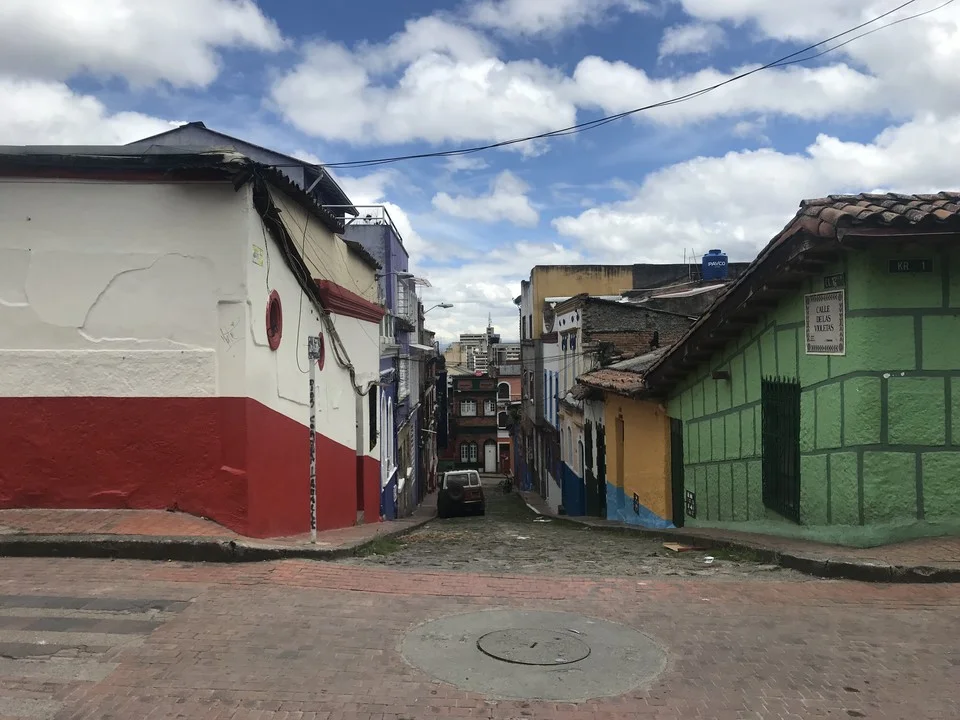trans:form:ed: the value of immersion in the face of complexity
Street view of La Candelaria from our recent scouting visit to Bogotá
By Ashley Lukasik
Emerging technology, new consumer behavior, unanticipated competition, worldwide political and social upheaval, information overload, climate crises. The conditions of today are more than complicated—they form a web. Each tangle we begin to unravel is anchored on a new knot. How can we create opportunities for global leaders and thinkers to isolate factors and identify potential solutions within the macro context?
Designers tend to be excellent facilitators, readily synthesizing complex information from multiple points of view and bubbling up to high-level themes that give a conversation shape and direction. Clients often report that collaborative design workshops are the most valuable part of a project, providing a hands-on opportunity to examine challenges through new lenses. However, the consulting model that most firms are organized around can make the delivery of design somewhat formulaic.
In partnership with Ruben Ocampo of ConicGroup and Openbox, I’ve developed an immersive model called trans:form:ed to put the magic power of design to use for a less industry or project specific purpose--one that is more exploratory and improvisational.
As opposed to a series of events, this is a platform model that allows us to engage with change makers in their own environments. Meals take the place of Powerpoint decks.
We experience new models firsthand, tour unusual establishments—such as farms, schools, slums and maker spaces—and enjoy intimate and informal conversation with peers and thought leaders.
Why Colombia?
Our first adventure will take us to Bogotá. We selected Colombia as the site for our inaugural immersion experience for several reasons. The country is experiencing a moment of redefinition—culturally, politically, and economically. Colombia is attracting more attention as a global player in emerging technology, entrepreneurship, and public private partnerships than ever before.
In the wake of the peace accord signed by the Colombia government and the FARC, the country is re-defining itself from the decades-long infamy as one of the most violent places on Earth to being one of the most appealing destinations for business tourism and culture in recent years.
The four-day program will begin with an overnight stay at La Palma y El Tucan, a coffee plantation rethinking sustainability not only from the perspective of greener coffee but entire ecosystems. The founders of the plantation have developed a collective model to meet the resourcing and distributions needs of 200 small, family-owned farms in their region, suggesting a modern approach to agriculture that may be replicated across Colombia and abroad. It will be a magical setting for our group to set the tone for our immersion.
We will visit entrepreneurs at some of Bogotá’s most provocative new ventures, like Rappi, dine with the chef of Tabula, featured in Anthony Bourdain's Parts Unknown and spend a day on a former coca farm now growing legal crops and employing former guerrillas to discuss policy and public private partnerships.
Each site has been carefully selected to provide context for the three modules our designers will facilitate: business opportunities in Colombia; strategies for our own organizations and industries; and reflection on personal and professional growth for the participants. For example, special guests will join us on a customized graffiti tour where the street art provides a back drop for our intimate conversation.
How did this come about?
The proof of concept for trans:form:ed was developed at IIT Institute of Design through seven Strategy World Tours in cities like San Francisco, Hong Kong, Shenzhen, Mumbai, Detroit, São Paulo and Mexico City. Opendox filmed the latter two, which explored “adaptive growth” with a focus on what the developed world can learn from ground up, networked innovation in Latin America. Everything was curated to reflect the themes we explored, from the accommodations to the food to the guest list.
We’ll continue this line of inquiry to Colombia, which will provide a rich context to explore conflict, identity and sustainability. trans:form:ed will be well suited to executives of global companies grappling with such universal themes. While we expect this to be particularly interesting to individuals and organizations seeking opportunities in Colombia, our modules will be flexible and adaptable to a variety of industries and regions. There is much that global organizations can learn from Colombia’s versatile and adaptive approach to innovation.
The model is deliberately porous, allowing for multiple inputs. Everything will be documented with film, photos, blogging, diagramming, and social media coverage. Corporate partners can conduct quick studies on factors that will soon impact their industries.
We are constantly being inundated with information and soundbytes, but enjoy less and less time for deep reflection necessary for addressing the complex challenges of our time. Additionally, tasting, touching, and using all our senses is critical to fully understanding information in context. trans:form:ed offers a new kind of experience that is less about imparting information and more about creating the right conditions to help participants arrive at meaningful insights. We expect to walk away with new lenses to think about solving problems or harnessing opportunities, as well as laying the groundwork for tangible partnerships.

